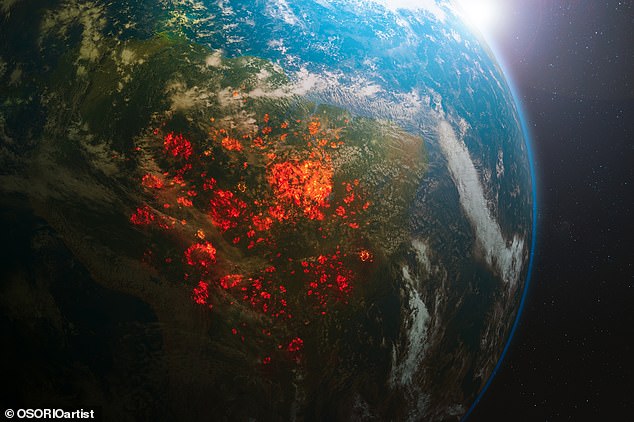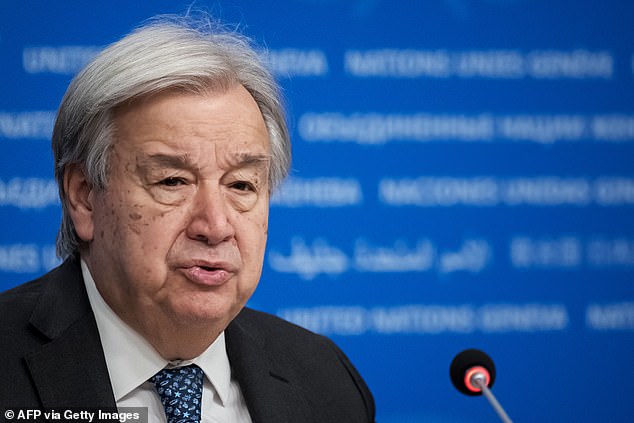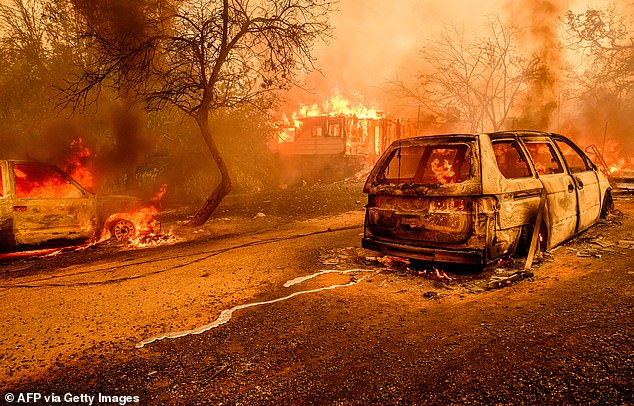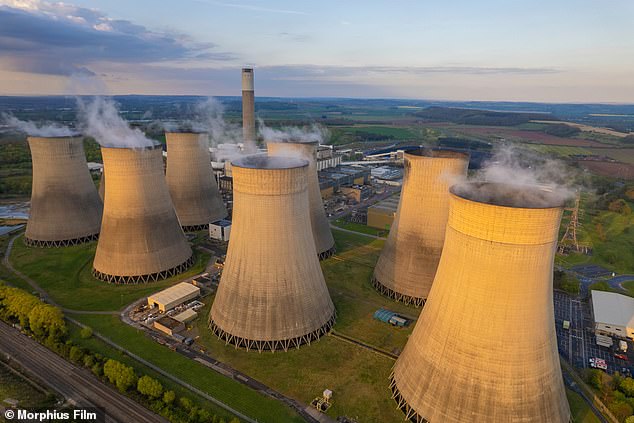It may already be too late to save the planet from human-caused global warming.
That’s according to the boss of the United Nations, who warns that ‘much greater ambition is required’ to fight climate change.
In his latest grim warning, UN Secretary-General António Guterres said that passing a critical global warming threshold is now ‘inevitable’.
Speaking in Switzerland on Wednesday, Mr Guterres said efforts to cap global warming at 1.5°C (2.7°F) above pre-industrial levels are sure to fail.
Going beyond this threshold, known as ‘overshooting’, will result in ‘devastating’ yet predictable impacts, including epic floods, fires and heatwaves.
‘Global warming is pushing our planet to the brink,’ Mr Guterres said.
‘One thing is already clear – we will not be able to contain the global warming below 1.5 degrees in the next few years.
‘Overshooting is now inevitable which means that we’re going to have a period, bigger or smaller, with higher or lower intensity, above 1.5 degrees in the years to come.’

Ahead of next month’s COP30 climate summit in Brazil, Guterres said going beyond 1.5C would result in ‘devastating’ yet predictable impacts
Guterres was speaking at the UN’s World Meteorological Organization (WMO) weather and climate agency in Geneva, Switzerland.
The 1.5°C threshold he mentioned refers to the Paris Agreement – the legally binding international treaty on climate change signed a decade ago.
The Paris Agreement aims to keep global temperature increases below 1.5°C compared with ‘pre-industrial’ levels – i.e., those before the Industrial Revolution when humans significantly triggered global warming with the burning of fossil fuels.
Already, countries are seeing the effects of climate change, but these events are set to get more intense as we approach ‘the point of no return’.
Each fraction of a degree of temperature increases the risk of catastrophic impacts, such as the Amazon rainforest drying out, more lethal killer heatwaves and wildfires, mass flooding from melting ice sheets and rising sea levels, and the destruction of marine life due to more acidic oceans.
Mr Guterres pointed out that every one of the last 10 years has been the hottest in recorded history, which isn’t a good omen for the Paris Agreement.
‘Ocean heat is breaking records while decimating ecosystems, and no country is safe from fires, floods, storms and heatwaves,’ the UN chief said.
Alarmingly, the UN chief has already said he thinks Earth will warm by 3°C (5.4°F) compared with pre-industrial levels.

Guterres was speaking at the UN’s World Meteorological Organization (WMO) weather and climate agency in Geneva on Wednesday

Global temperature increases boost the risk of catastrophic events such as droughts and intense wildfires. Pictured, Molten metal from a burned car meanders on the road as flames engulf a home during the Thompson fire in Oroville, California on July 2, 2024
Unfortunately, the latest pledges to slash carbon emissions from countries around the world come nowhere near meeting the 1.5°C target.
Mr Guterres said pledges covering 70 per cent of global emissions suggested a cut in carbon pollution by around 10 per cent by 2035, but according to the UN’s Intergovernmental Panel on Climate Change, emissions must fall 60 per cent by 2035, from 2019 levels, for a good chance of limiting warming to 1.5°C with no or limited overshoot.
In his address, Guterres also urged countries to implement disaster warning systems to protect people against extreme weather, yet another symptom of climate change.
In addition, he insisted on the need to fight misinformation, online harassment and ‘greenwashing’ – a deceptive marketing tactic used by certain companies to make them seem more eco-friendly than they actually are.
His remarks will be seen in some quarters as a riposte to Donald Trump’s recent speech at the United Nations in New York, in which the president championed fossil fuels and derided green technologies.
President Trump called climate change ‘the greatest con job ever perpetrated on the world’ and the carbon footprint ‘a hoax made up by people with evil intentions’.
He also praised his administration’s war on solar and wind power, bolstered by a new law that ends clean energy tax credits.
‘We’re getting rid of the falsely named renewables, by the way – they’re a joke, they don’t work, they’re too expensive,’ Trump added.

The UN secretary-general and US President Donald Trump are on opposite sides of the global climate debate. They’re pictured together at the Gaza Peace Summit in Sharm El-Sheikh, Egypt, October 13, 2025

Greenhouse gases come largely from burning fossil fuels for energy. Pictured, the UK’s last ever operating coal power station, in Ratcliffe-on-Soar in Nottinghamshire, shut down for good in September 2024
There are some promising signs, however; in 2024, ‘almost all new power capacity came from renewables’, which Guterres called the ‘cheapest, fastest and smartest source of new power’.
Renewables include solar, wind, and geothermal, and contrast with the more harmful fossil fuels that emit greenhouse gases when burnt – oil, coal and gas.
‘Renewables represent the only credible path to end the relentless destruction of our climate,’ added Guterres, who was speaking ahead of the COP30 summit next month.
Taking place from November 10-21 in Belém, Brazil, COP30 will host the world’s leaders to negotiate a response to climate change and monitor the progress made.
Before COP30, the UN secretary-general urged countries to submit ‘bold’ climate plans that align with the 1.5°C goal.
